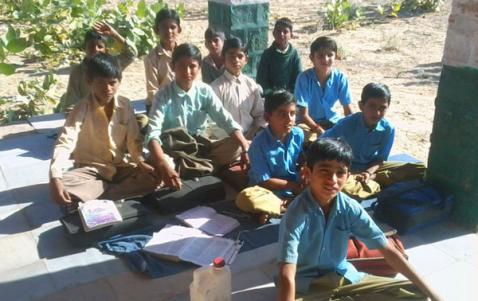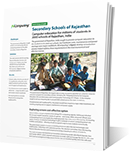CASO DE ÉXITO
Computer education for millions of students in 2000 schools of Rajasthan, India
The government of Rajasthan, India sought to provide computer education to the students in its state-run schools, but hardware costs, maintenance and power shortage were major roadblocks. NComputing’s vSpace desktop virtualization solution helped address these requirements in the most economical and effective manner.
The government of Rajasthan, the largest state in India, focused its attention on a massive computer education program for secondary schools. Termed as the ‘Integrated Scheme for Computer Education (CE) and Information and Communication Technology (ICT) Phase—II’, the initiative sought to set up computing labs in around 2000 schools across the state’s 33 districts.

If implemented with traditional PCs, the project would have required a major initial investment, not counting ongoing costs in support, maintenance and power supply.
Exploring a more cost-effective option
School children use just a fraction of an average PC’s computing capacity. Setting up individual PCs for each student would be a waste of capacity – and money. While concerned officials were contemplating how to accomplish this challenging task, they came across NComputing. NComputing applies desktop virtualization technology to split a computer or server’s computing power into multiple workstations – allowing schools to expand usage to more students economically.
The government created a transparent bidding process to select the best technologies and implementers. Following a strict selection process, the selection committee chose NComputing, Pearson Education Services and CompuCom to bring computing to millions of students.
The implementation was based on an innovative outsourcing model called Build, Operate, Own and Transfer (BOOT), which required outsourcers to install, staff and manage the labs for a five-year term. Such an arrangement helps ensure that the labs are installed quickly and in line with strict performance benchmarks. The five-year period also enables school staff to develop their own skills, not only in computer-aided teaching methodologies but also in managing the labs.
“We were pleased to partner with NComputing for this project,” said S K Surana, managing director, CompuCom. “The combination of NComputing’s cost-effective shared computing solution with our world-class education services has been a winning combination for this initiative, and could be easily replicated for public and private educational institutions across the state.”
“At Pearson, we are committed to fulfilling the educational needs of schools across the country with the best content and the most reliable and proven technologies,” added Srikanth Iyer, COO, Pearson Education Services. “We worked with NComputing to successfully implement computer labs with their technology, resolving challenges like access and affordable computing for government schools in Rajasthan, especially in rural and underserved areas. The technology also delivers a very positive green impact.”
75 percent less support, maintenance
The state deployed NComputing X-series thin client access devices in each lab on the vSpace desktop virtualization platform. A keyboard, mouse and monitor are connected to each thin client access device, making it appear as if each student has his or her own PC to work on.
Apart from a low initial purchase price, NComputing brought additional benefits. These solutions require 75 percent less support and maintenance, and 90 percent less electricity. NComputing devices use just 1 watt of electricity compared to 120 watts in a traditional PC. This is a critical advantage in remote parts of the state where power supply is a perennial issue.
NComputing’s unique architecture also ensures 100 percent uptime, guaranteeing uninterrupted usage.
400,000 NComputing virtual desktops
NComputing has almost become a de-facto solution of choice for affordable computer education across the country. More than 400,000 NComputing virtual desktops are already deployed in major state-run education projects in Andhra Pradesh, Bihar, Punjab and Maharashtra, as well as many private education institutions throughout India.
“By investing in the adoption of ICT in schools and by deploying progressive solutions such as NComputing’s desktop virtualization technology , the quality and access to education and information has increased many-fold for hundreds of thousands of children,” said Manish Sharma, vice president Asia Pacific, NComputing.
“Rajasthan is one of the most progressive states and it is delightful to see the way the government has encouraged the adoption of ICT in schools for enhancing quality of education, for equipping the students with skills for a better future,” he added. “NComputing has been regularly partnering with governments of Indian states for bringing the benefit of ICT to millions of students in the country. NComputing is pleased to bring the benefit of shared computing technology to the state of Rajasthan too.”
Suggested reading




